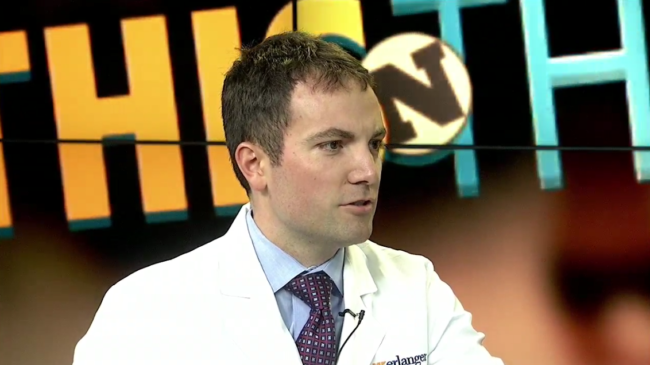This N That host James Howard interviews Dr. James Fleming from The Southeast Regional Stroke Center at Erlanger Health System.
When we say stroke, Dr. Fleming, what exactly is going on in our head?
Good question. A stroke happens when you have blood flow cut off to part of the brain. When that part of the brain doesn’t get good blood flow, it doesn’t get good oxygen. Without oxygen, those brain cells don’t function normally, and when they’re not functioning normally you get a symptom. That could be decreased vision, word-finding trouble, slurred speech, facial drooping, weakness, or numbness. Those symptoms could be permanent if you don’t seek immediate medical attention.
When it comes to stroke, working to decrease our risk is extremely important, isn’t it?
There are many factors to take into consideration [for decreasing risk of stroke]. There are three that I would like to bring up.
First of all, quit smoking. Smoking increases your risk of stroke at least twice depending on how much you smoke. A lot of patients ask [questions like] “If I’ve been smoking for decades, does it really help me to quit smoking now?” We have good evidence that if you quit smoking, in ten years time your risk is the same as anybody else. So, yes, it does help to quit smoking despite your age. There are many ways to help kick the habit and many brave people have done it. I would encourage anyone who smokes to talk with their doctor about options to help them quit smoking.
The two other concerns I would consider: diet and exercise. It’s important to take those seriously. As doctors we often tell patients about diet and exercise but it’s particularly important with stroke. Exercise can come in many forms. The American Heart Association recommends 3 times per week for at least 40 minutes per session. If you don’t like the gym, Chattanooga has excellent outdoor opportunities from walking on the Riverwalk, to biking, to hiking, mountain biking, and climbing. Of course you want to speak with your doctor before starting a new exercise regimen but there is really no excuse. There are so many options.
We’ve done those three things: we quit smoking, we’re eating right, we’re starting to exercise. What if a patient has never smoked and has stayed fit but a family member has suffered a stroke – a mom or dad. Is that something to be cautious about? Is it hereditary?
There are some types of hereditary stroke but that is not the most common. The majority [of risks] are lifestyle choices. [These choices] often run in families as well; if you eat just like your parents or you have some of the habits your parents had earlier in life, it may look like it’s hereditary when in fact it’s just lifestyle.
What are the symptoms of a stroke?
Unlike a heart attack, a stroke is often painless and you may not take it as seriously. It’s very abrupt. It can include trouble with your vision, trouble finding words, slurred speech, facial drooping, weakness, or numbness to name a few. It’s critical you call 911 immediately. If you delay calling 911, there may be fewer options available for treatment.
Erlanger is a comprehensive stroke center (and the only one in the region) which means we can provide the highest level of care for stroke. This may include a medication called a “clot buster,” or possibly even a procedure to remove the clot. Remember: Time is brain and it is of utmost importance that you call immediately.
Erlanger Southeast Regional Stroke Center is one of the largest stroke centers in the nation and a world leader in interventional care. Learn more about our 24/7 stroke coverage, clinical trials and advanced treatments.







